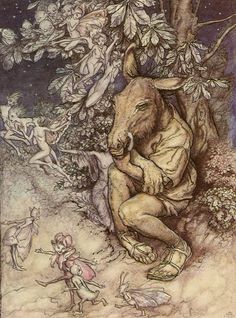“We start Romeo and Juliet next week!”
It was the moment I’ve literally been waiting eight years for. Last night at dinner, my daughter informed me that her class was starting Shakespeare this week.
My children have literally been raised on Shakespeare – my oldest since she was old enough to ask me questions, my middle since before she can remember, and my youngest since before he could walk (he saw his first Tempest while still in a stroller).
August, 2007. Or this one from March 2006 where I even wrote, “My daughter is only four and it pains me that I can’t share Shakespeare with her yet.”
I have Shakespeare action figures in the house. My phone plays “Shall I Compare Thee To A Summer’s Day” (as sung by Pink Floyd’s David Gilmour). My children start asking me questions about Shakespeare, and the journey begins. It’s been around them since before they can remember, of course, but now we can actually interact on the subject. The link is just one of many, many stories I’ve posted over the years.
Many times I have gone into classrooms to volunteer, knowing full well that second and third graders are unlikely to understand and retain the original language. Instead, my mission has always been to break the stigma of Shakespeare as difficult and boring, something to be dreaded. I will often say to classrooms, “Even if you don’t understand everything that we talked about today, one day years from now when you’re in high school, a teacher is going to drop Romeo and Juliet in front of you and while some of the kids groan and roll their eyes, you’re going to be the ones to say, “Ohhhhhhh! I get this!” Obviously my children will be the ones to lead by example. Their friends and schoolmates will only see me a couple of times a year (if that). My children eat sleep and breathe it.
And now that day is here. Has the mission been a success? Is my daughter going to fly through the class, bringing all kinds of passion for the subject with her to share? Will the teacher discover the junior Shakespeare geeklet she’s destined to become?
Her first assignment is to write a sonnet. So I suppose that the teacher’s doing some sort of crash course in all things Shakespeare before diving into the play, which is fine and probably necessary. She tells me that part of the assignment is to write an actual, good sonnet and not just count syllables, and I nod my approval at this teacher’s standards. I ask what she knows about sonnets, she says something about syllables and then tells me that they literally just started today, so they haven’t covered much. I ask her what a “volta” is, and tell her to get back to me when the class gets that far.
I ask whether she’s at all mentioned that she was raised on Shakespeare, has known Sonnet 18 since she was five years old, and along with her siblings can count herself as the youngest person to ever see the inside of the Folger Shakespeare vault. She said, “It hasn’t come up.”
It turns out that she’s deathly afraid of her Shakespeare teacher. He’s one of those guys with a dark, sarcastic sense of humor that’s very intimidating to the students. I’ve seen it in action, and I’m not a fan. But I’ve seen it only briefly, through my daughter’s filter, so I may have been too hard on the guy. It’s quite possible that I’d get along with him swimmingly. He’s a good teacher, her grades are good. He’s just not the kind of guy students feel that they can have any sort of extra conversation with.
I remind my daughter that this has been years in the making and she will be missing a tremendous opportunity if she doesn’t say *something*. I fully expect that most of the other students in the room know her relationship to Shakespeare, so maybe one of them will say something. Even if he’d asked, “Is anyone already familiar with Shakespeare?” she would have had the opportunity to say any number of things, she’s got a literal lifetime of relevant stories.
The best possible outcome is that she does mention it, the teacher is receptive, and I get to come in and volunteer in that class. I’m not holding out hope, though, because as the kids have gotten older the room for volunteer parents in that capacity has approached nil. In elementary school, any diversion from the norm is seen as interesting and entertaining for the students, a break from the pattern, and is welcome. But as they get older it’s more about “What are you teaching them, how much time are you spending on that topic, and how are you going to measure it? Ok, great, move on. Repeat.” I can keep my fingers crossed – honestly, I won’t be able to help it, I’ll be thinking of what I’d say if given the chance – but I have to be prepared for the opposite end of the spectrum, which is that she tells him and he doesn’t care, and it turns into just a regular series of lessons like with geometry where the teacher says one thing, then my daughter comes home and I explain all the good and interesting stuff that the teacher has chosen to gloss over.
I will report back regularly. Brace yourselves, it’s going to be a bumpy ride!




